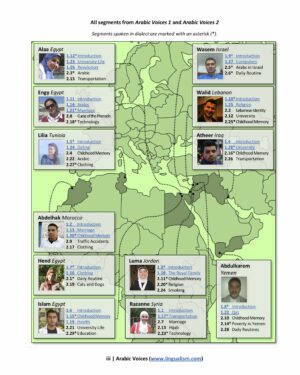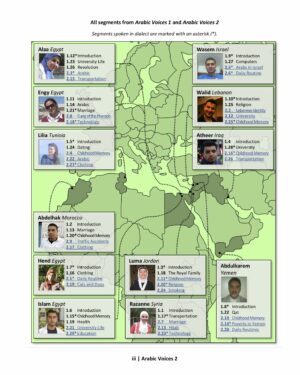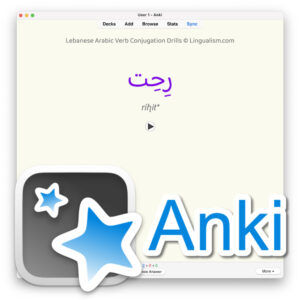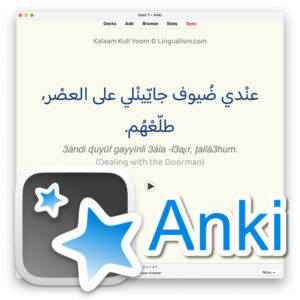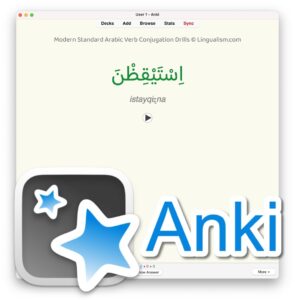Home » Modern Standard Arabic » Health–Islam
Health–Islam
| Greetings! [00:00] | السلام عليكم ورحمة الله وبركاته، | |
| Hello and welcome to another Arabic Voices video. [00:03] | أهلاً ومرحبًا بكم في فيديو آخر من فيديوهات Arabic Voices. | |
| Today we will talk about what Islam said about health and the various guidelines that he gave to enjoy health and wellness. [00:07] | اليوم سنتحدّث عمّا قاله إسلام بشأن الصحة والإرشادات المختلفة، التي قد أعطاها للتمتع بالصحة والعافية. | |
| So we start first with page 105, specifically on line 2. [00:18] | فنبدأ أولًا بالصفحة المائة وخمسة وتحديدًا في السطر الثاني. | |
| Islam says, "I hope you are in complete health and wellness." So Islam here uses the phrase الصحة والعافية (health and wellness) on this line. And in the next line as well. [00:27] | يقول إسلام (أرجو أن تكونوا في تمام الصحة والعافية) فيستخدم إسلام هنا عبارة [الصحة والعافية] في هذا السطر. وفي السطر الذي يليه كذلك. | |
| This phrase is common in the Arabic language to use the word 'health' along with the word 'wellness.' Although the two words may have the same meaning, we often use the phrase health and wellness. [00:41] | وهذه العبارة شائعة في اللغة العربية أن تستخدم كلمة [الصحة] ومعها كلمة [العافية] رغم أن الكلمتين قد يكونان بمعنّا واحد، ولكن غالبًا ما نستخدم العبارة الصحة والعافية. | |
| "I wish you well; I hope they are well." Thus, the phrase health and wellness is often the case. [00:58] | (أتمنى لك الصحة والعافية، أتمنى أن يكونوا بصحة وعافية) وهكذا، فغالبًا ما تكون العبارة الصحة والعافية. | |
| We then move on to line 3. Islam says, "And in order for you to be in complete health and wellness, you must follow the instructions and proceed with the instructions." [01:11] | ننتقل بعد ذلك إلى السطر الثالث - يقول إسلام: (ولكي تكونوا في تمام الصحة والعافية، عليكم بإتباع التعليمات والمضي مع الإرشادات). | |
| Islam here uses the phrase عليكم بـ to indicate that you should do a certain thing, or you should perform a certain thing. [01:27] | يستخدم إسلام هنا عبارة [عليكم ب] للإرشاد إلى أنه ينبغي أن تقوم بأداء شيء معين، أو يجب أن تقوم بأداء شيء معين. | |
| If you want to advise someone, you can use this phrase, and… and you must use the preposition بـ with it. So you say, for example, "You have to read if you want to succeed; you have to studying" and so on. [01:41] | فإذا أردت أن تنصح أحدًا فيمكنك أن تستخدم هذه العبارة [عليك ب] و… ولابدّ أن تستخدم [حرف الباء] معها فتقول مثلًا: (عليك بالقراءة إذا أردت النجاح، فعليك بالمذاكرة) وهكذا. | |
| You use عليك and then you use the preposition بـ along with it. [02:03] | تستخدم [عليك] وبعد ذلك تستخدم حرف [الباء] معها. | |
| You can also use instead of بـ you can use the masdar (gerund). You can say عليك بالمذاكرة or عليك أن تذاكر. "If you want to succeed, you have to study" or "you have to study." [02:09] | كما يمكنك أن تستخدم بدلًا من حرف [الباء] يمكنك أن تستخدم المصدر المؤول بأن، فيمكنك أن تقول (عليك بالمذاكرة) أو (عليك أن تذاكر) (إذا أردت النجاح فعليك بالمذاكرة) أو (عليك أن تذاكر). | |
| Here we can say 'and in order for you to be in complete health and wellness, you must follow the instructions and go with the guidance… with the instructions.' you can use بـ or أن without بـ. [02:28] | يمكن هنا أن نقول (ولكي تكونوا في تمام الصحة والعافية، عليكم أن تتبعوا التعليمات و المضي مع الإرشاد… مع الإرشادات) فيمكنك أن تستخدم [الباء] أو المصدرالمؤول بأن بدون الباء. | |
| Great! We then move on to line 6. Islam says, "I did not know her until today." And here, Islam uses the negation to say that he did not know anything in the past. [02:48] | عظيم! ننتقل بعد ذلك إلى السطر السادس - يقول إسلام: (لم أكن أعلمها حتى اليوم) وهنا يستخدم إسلام النفي ليقول أنه لم يكن يعلم شيئًا في الماضي. | |
| If you carefully consider here the negative form, Islam uses the present (indicative) verb and precedes it with the participle لم, and it is... the form here is in the present tense, but the meaning is in the past. [03:08] | وإذا دققت النظر هنا في صيغة النفي يستخدم إسلام [الفعل المضارع] ويسبقه بأداة [لم]، ويكون… وتكون الصيغة هنا في المضارع، ولكن المعنى يكون في الماضي. | |
| If you want to negate something that you did in the past or did not do in the past, you use the negation لم, and not the past. [03:25] | فإذا أردت أن تنفي شيئًا قد فعلته في الماضي أو لم تفعله في الماضي تستخدم أداة النفي [لم مع الفعل المضارع] وليس الماضي، | |
| The meaning is in the past, but the formula appears in the present tense, for example, "I did not read the book." [03:39] | المعنى يكون في الماضي ولكن الصيغة تبدو في المضارع تقول مثلًا : (أنا لم أقرأ الكتاب) | |
| That means you didn't read it in the past, although the verb is in the present tense. "I didn't eat food... I didn't eat food yesterday; I didn't listen to music yesterday" and so on. [03:52] | وهذا يعني أنك لم تقرأه في الماضي، رغم أن الفعل يكون في صيغة المضارع (لم آكل الطعام… لم آكل الطعام أمس، لم أستمع إلى الموسيقى أمس) وهكذا. | |
| لم plus the present verb means negation in the past tense, even if the form is in the present tense. [04:12] | [لم والفعل المضارع] تعني النفي في زمن الماضي، حتى وإن كانت الصيغة في الزمن المضارع. | |
| Great!! We then move to line 12. Islam says: [04:24] | عظيم!! ننتقل بعد ذلك إلى السطر الثاني عشر- يقول إسلام: | |
| "There are several types of health, such as physical, mental and social health, as mentioned in the definition. So Islam is used here the particle كـ (as). [04:33] | (هناك عدة أنواع من الصحة كالصحة البدنية والعقلية والاجتماعية كالمذكور في التعريف) فيستخدم إسلام هنا [حرف الكاف]. | |
| The particle كـ has different uses, and one of the uses of the letter kaf is to make similarities between something you say now and something and something else you have said before, or something you see and something else that the reader knows. [04:44] | وحرف الكاف له استخدامات مختلفة، وأحد استخدامات حرف الكاف هو أن تشابه بين شيءٍ تقوله الآن وشيءٍ وشيئًا آخر قد قلته من قبل، أو شيءٍ تراه و شيئًا آخر يعرفه القارئ. | |
| For example, you say here or say Islam here "as mentioned in the definition." And Islam here refers to something similar to what he mentioned in the definition. [05:01] | فمثلًا تقول هنا أو يقول إسلام هنا (كالمذكور في التعريف) ويشير إسلام هنا إلى شيءٍ مماثل لما ذكره في التعريف. | |
| You say, for example, "this book is like that book, this building is like that building," and so on. [05:11] | تقول مثلًا (هذا الكتاب كذاك الكتاب، هذا البناء كذاك البناء) وهكذا. | |
| So she uses the letter kaf for similarity, to make a similarity between one thing and something else. [05:20] | فتستخدم حرف الكاف للمشابهة، لتشابه بين شيء وشيءٍ آخر. | |
| You can also use [like], so we can say here "like physical, mental, and social health, as mentioned in the definition... as mentioned in the definition." [05:26] | كما يمكنك كذلك أن تستخدم [مثل] فيمكن أن نقول هنا (كالصحة البدنية والعقلية والاجتماعية مثل المذكور في التعريف… مثل المذكور في التعريف). | |
| He says the same as what we have mentioned, similar to what we have mentioned in the definition. For similarity to express similarity, you can use the preposition كـ or مثل. Both have the same meaning. [05:40] | فهو يقول مثل ما قد ذكرناه مشابهًا لما قد ذكرناه في التعريف، فللتشابه لتعبر عن التشابه يمكنك أن تستخدم [حرف الكاف] أو[مثل] كلاهما بمعنّا واحد. | |
| We will see this in other examples, as we read… or hear what Arabic speakers have said while writing. [05:58] | وسنرى ذلك في أمثلة أخرى، أثناء قرائتنا ل… أو سماعنا لما قاله المتحدّثون باللغة العربية في أثناء الكتابة. | |
| Great!! We then move on to line 13. Islam says, "You have some advice from me that will… both of us will benefit from it… we will both benefit from it." Here Islam uses the verb [to benefit], and with it the preposition من (from). [06:14] | عظيم!! ننتقل بعد ذلك إلى السطر الثالث عشر - يقول إسلام: (فلك مني بعض النصائح التي سي… سيستفيد منها كلانا… سيستفيد منها كلانا) فهنا يستخدم إسلام الفعل [يستفيد]، ويستخدم معه حرف الجر [من]. | |
| The verb يستفيد (benefits)... if you want to use the verb يستفيد, we often use the preposition من with it. "I benefit from reading; I benefit from knowledge, and so on. I benefit from advice." The preposition من is used with the verb يستفيد. [06:37] | والفعل [يستفيد] إذا أردت أن تستخدم فعل [يستفيد] غالبًا ما نستخدم معه حرف الجر [من]، (أستفيد من القراءة، أستفيد من العلم، وهكذا، أستفيد من النصائح). فحرف الجر [من] يُستخدم مع الفعل [يستفيد]. | |
| After that, Islam says, finally, on line 15, "Or at least a little walk per day...or at least a little of walking daily." [06:59] | بعد ذلك يقول إسلام وأخيرًا في السطر الخامس عشر: (أوعلى الأقل قليل من المشي يوميًا… أوعلى الأقل قليل من المشي يوميًا) | |
| So, Islam here uses at the end of the sentence the adverb of time يوميًا (daily) to indicate that this event occurs every day. [07:15] | فيستخدم إسلام هنا في نهاية الجملة ظرف الزمان [يوميًا] للإشارة إلى أن هذا الحدث يحدث كل يوم. | |
| You can say "or at least a little walk every day." You can say كل (all). كل يوم or you can say يوميًا, which is the adverb of time. [07:26] | يمكنك أن تقول (أو على الأقل قليل من المشي كل يوم) يمكنك أن تقول كل. [كل يوم] أو يمكنك أن تقول [يوميًا] وهو ظرف الزمان. | |
| You can also use the same form to express another time event such as if you want to say you do something every week for example, you can say 'weekly.' [07:38] | وكذلك يمكنك أن تستخدم نفس الصيغة للتعبير عن حدث زمني آخر مثل إذا أردت أن تقول أنك تفعل شيء كل أسبوع مثلًا، فيمكنك أن تقول [أسبوعيًا]، | |
| If you do it every month, you can say 'monthly.' If you do it every year, you can to say 'yearly,' and so on. [07:52] | إذا كنت تقوم بأداءه كل شهر فيمكنك أن تقول [شهريًا]، إذا كنت تقوم به كل سنة فيمكنك أن تقول [سنويًا]، وهكذا. | |
| For example, 'I exercise three times a week.' [08:02] | مثلًا (أنا أمارس الرياضة ثلاث مرات أسبوعيًا، | |
| I go to university five times a month, I get a certain amount of money annually. That is... every year, every month, every week, every day, and so on. [08:10] | أنا أذهب إلى الجامعة خمس مرات شهريًا، أنا أحصل على قدر من المال سنويًا) أي كلاس… كل سنة أو كل شهر أو كل أسبوع أو كل يوم وهكذا. | |
| You can use the adverb of time in such a case: daily, weekly, monthly, yearly. [08:31] | يمكنك أن تستخدم صيغة ظرف الزمان في مثل هذه الحالة [يوميًا، أسبوعيًا، شهريًا، سنويًا]. | |
| And with this, we have finished commenting on what Islam said about health. [08:43] | وبهذا نكون قد انتهينا من التعليق عمّا قاله إسلام بشأن الصحة. | |
| In the end, I wish you good health. [08:49] | وفي النهاية أتمنى لكم الصحة والعافية. | |
| Thank you very much for your kind listening. May the peace, mercy and blessings of God be upon you. [08:52] | أشكركم شكرًا جزيلًا لحسن استماعكم، والسلام عليكم ورحمة الله وبركاته. |
Video Lessons
Arabic Voices MSA Lessons
Arabic teacher Mostafa Ahmed takes us through segments in MSA from Lingualism's book Arabic Voices 1: Authentic Listening and Reading Practice in Modern Standard Arabic and Colloquial Dialects, explaining interesting points of grammar and vocabulary.
© 2024 Lingualism LLC


